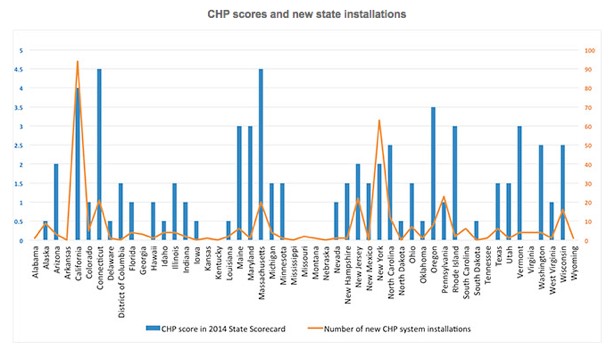CHP Deployment
Post on: 16 Март, 2015 No Comment

CHP Deployment
Combined heat and power (CHP) —sometimes referred to as cogeneration—provides a cost-effective, near-term opportunity to improve our nation’s energy, environmental, and economic future. CHP is an efficient and clean approach to generating on-site electric power and useful thermal energy from a single fuel source. Instead of purchasing electricity from the grid and burning fuel in an on-site furnace or boiler to produce thermal energy, CHP provides both energy services to a facility in one energy-efficient step. Accelerated CHP has proven its effectiveness and holds promise for the future—as an:
- Environmental Solution – Significantly reducing CO2 emissions through greater energy efficiency
- Competitive Business Solution – Increasing efficiency, reducing business costs, and creating green-collar jobs
- Local Energy Solution – Deployable throughout the United States
- Infrastructure Modernization Solution – Relieving grid congestion and improving energy security.

The Advanced Manufacturing Office’s CHP Deployment Program provides stakeholders with the resources necessary to identify CHP market opportunities and support implementation of CHP systems in industrial, federal, commercial, institutional, and other applications. A CHP blog post and infographic provides details on the Energy Department’s ongoing activities in support of Executive Order 13624 Accelerating Investment in Industrial Energy Efficiency . Access the CHP Installation Database .
CHP Technical Assistance Partnerships (CHP TAPs)
DOE’s CHP Technical Assistance Partnerships (CHP TAPs) promote and assist in transforming the market for CHP, waste heat to power, and district energy with CHP throughout the United States. Visit the individual DOE CHP TAPs web sites for details on the services provided. More than 150 project profiles are available .
Boiler MACT Technical Assistance
EPA finalized its Clean Air Act pollution standards that apply to large and small boilers in a wide range of facilities and institutions. DOE is offering technical assistance to ensure that major sources burning coal or oil have information on cost-effective clean energy strategies for compliance, such as natural gas CHP, and to promote cleaner, more efficient boilers to cut harmful pollution and reduce operational costs.
DOE has partnered with EPA on the State & Local Energy Efficiency Action Network (SEE Action). SEE Action is a state and local effort facilitated by the federal government that helps states, utilities, and other local stakeholders take energy efficiency to scale and achieve all cost-effective energy efficiency by 2020. The Industrial Energy Efficiency/Combined Heat & Power Working Group has developed a number of resources including a Guide to Successful Implementation of State Combined Heat and Power Policies .














